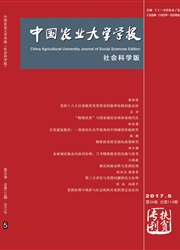

 中文摘要:
中文摘要:
在全球森林管理权力下放趋势中,中国的集体林权改革是一个举世瞩目的组成部分。一个重要问题是基层社区如何对产权改革政策进行响应,行动者如何看待"自上而下"的改革政策以及如何基于基层环境采取行动策略。文章选取江西省婺源县的两个村庄社区作为案例调查点,通过长期观察和访谈对基层社区行动者在林改过程中的解构实践进行了案例剖析。研究结果发现,地方政府倾向于"因地制宜"地进行国家政策的解构后再实施改革政策;而基层社区的传统认知和产权体系则从实践层面对国家管理逻辑进行解构。一个经验性结论是基层社区行动者往往倾向于基于自身策略而对国家政策进行解构,即摧毁政策文本在政策制定者心目中的传统建构,而重构出另外一个"虚构的文本"。
 英文摘要:
英文摘要:
Collective forest tenure reform in China is a remarkable part of the global trend of forest management decentralization.An important issue needed to be considered is how the grassroots community responds to this reform and how the different actors perceive the "top-down" reform policies and how to take action strategy based on grass-roots environmental.This paper used two villages in Wuyuan County in Jiangxi Province as case studies spot,through long-term observation and interviews with grassroots community and actors,authors analyze the deconstruction practices in the process of tenure reform.We found that local governments tend to carry out national policy according to the "local conditions" and take implementation of the reform policies after deconstruction;meanwhile,the grass-roots communities tend to deconstruct the national management logic in the daily practice level using the traditional knowledge and local property rights system.An empirical conclusion is: the grass-roots communities tend to deconstruct the national policies based on its own strategy,which means to destroy traditional construction in the minds of policy makers,thus reconstruct another "fictional text."
 同期刊论文项目
同期刊论文项目
 同项目期刊论文
同项目期刊论文
 期刊信息
期刊信息
